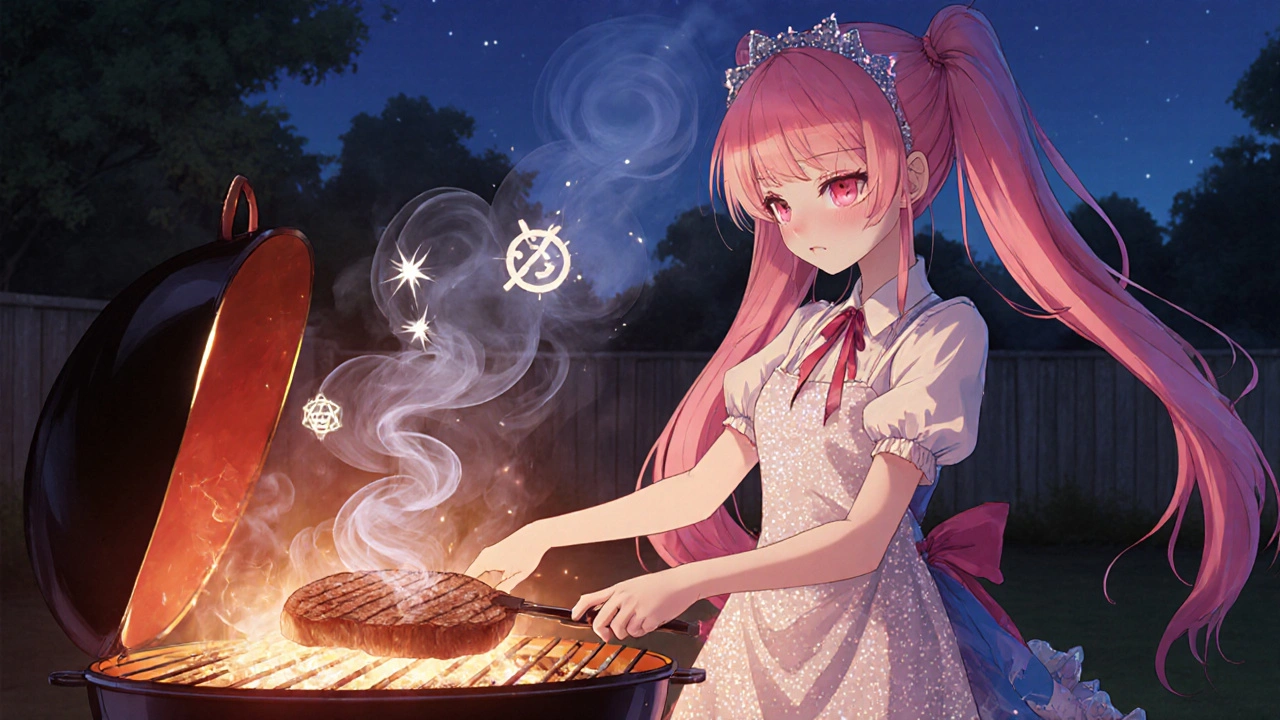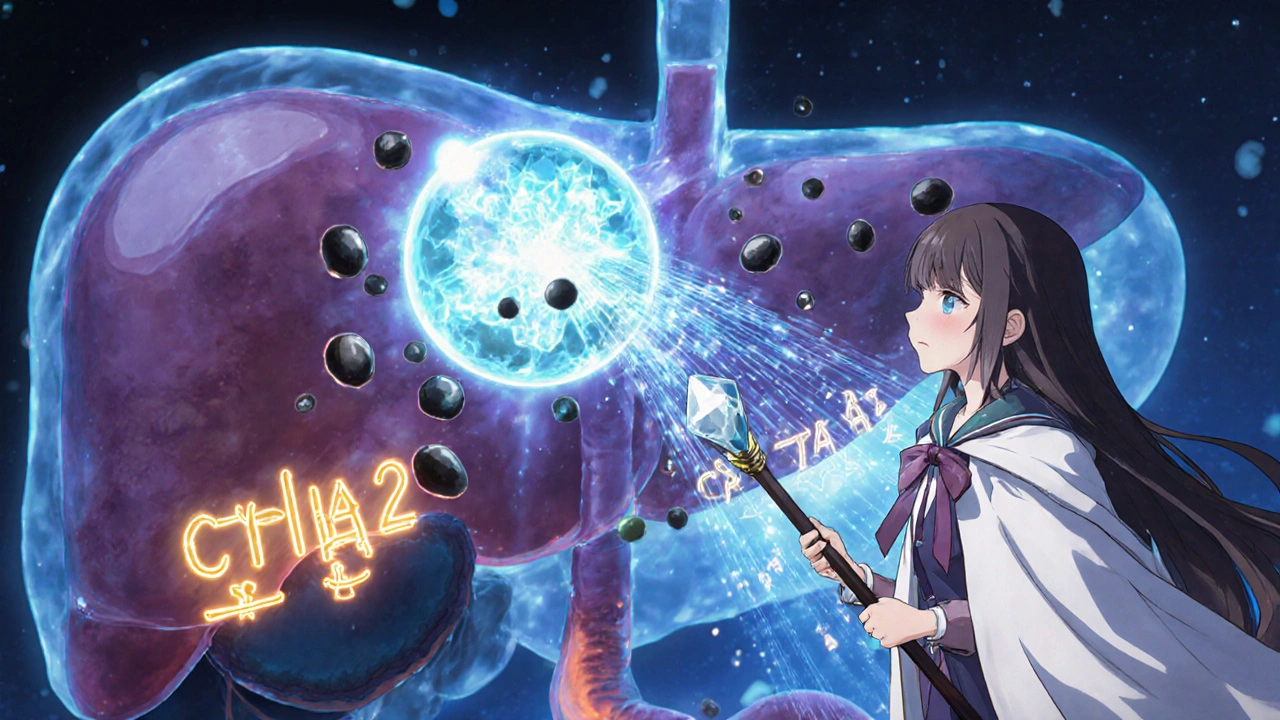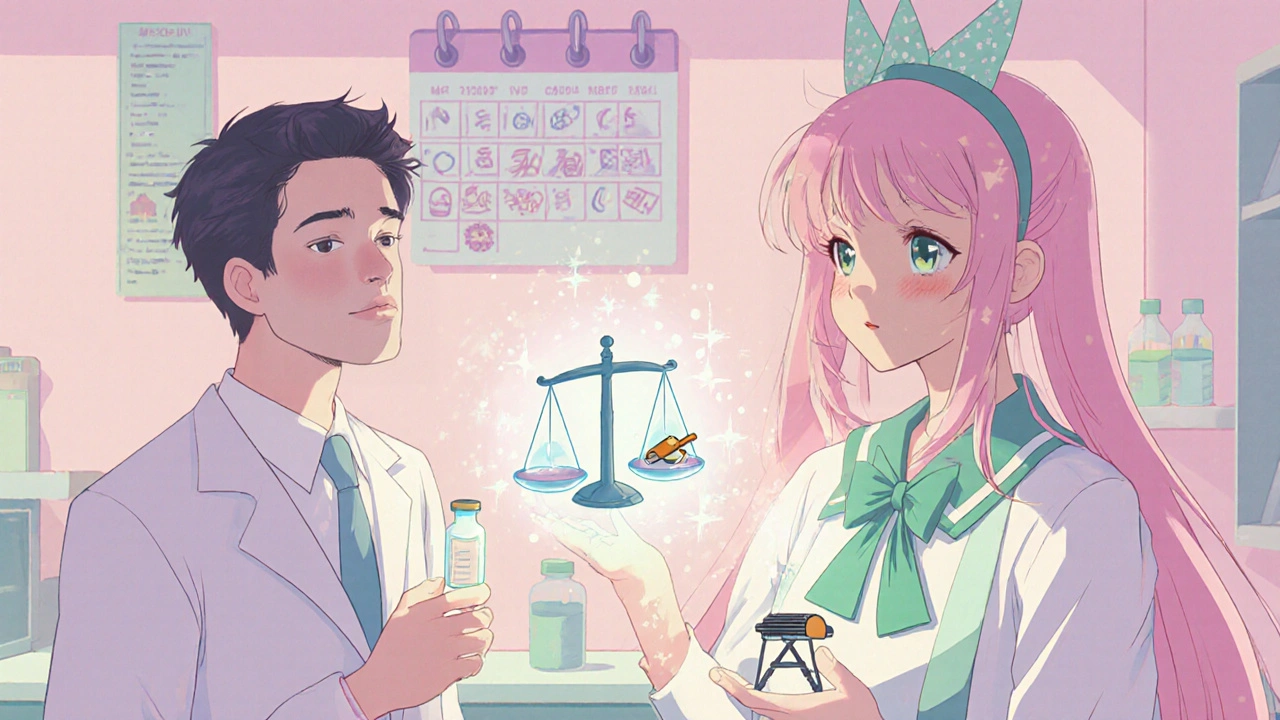 Oct, 25 2025
Oct, 25 2025
CYP1A2 Induction Calculator
This tool estimates potential CYP1A2 enzyme induction from charcoal-grilled meat consumption. Based on clinical studies (Fontana 1999 and Larsen 2005), it helps assess risk for medications metabolized by CYP1A2.
Results
Important: This tool provides general estimates based on published studies. Never adjust your medication without consulting your healthcare provider.
Smoking is a significantly stronger CYP1A2 inducer (200-400% increase) compared to charcoal-grilled meat. If you smoke, this risk is substantially higher than diet alone.
Ever wondered whether that weekend barbecue could mess with the pills you rely on? The short answer is: it’s a gray area, but the science behind CYP1A2 induction gives us clues. Let’s break down what happens when you eat charcoal‑grilled meat, why the liver enzyme CYP1A2 matters, and what the research actually says.
Why Charcoal Grilling Raises Questions
When you sear a steak over hot coals, you create a tasty crust. But the high temperature also produces chemicals called polycyclic aromatic hydrocarbons (PAHs) and heterocyclic amines (HCAs). These compounds are the same ones that give grilled food its distinct flavor and aroma, yet they also have a biochemical side‑effect: they can turn on certain drug‑metabolising enzymes.
The Science of CYP1A2
CYP1A2 is a liver enzyme that belongs to the cytochrome P450 family. It handles roughly 10 % of the drugs we take, including antipsychotics like clozapine, the bronchodilator theophylline, caffeine, and the Alzheimer’s drug tacrine. When CYP1A2 activity goes up, these medicines break down faster, potentially reducing their effectiveness.
Unlike strong inducers such as cigarette smoke-which can boost CYP1A2 activity by 200‑400 %-dietary factors are less potent and far more variable. That’s why the FDA and EMA do not list grilled meat on drug labels.
PAHs, Benzo[a]pyrene, and the AhR Pathway
Among PAHs, benzo[a]pyrene is the star player. It binds to the aryl hydrocarbon receptor (Aryl hydrocarbon receptor (AhR)), a cellular sensor that, once activated, travels to the nucleus and tells the CYP1A2 gene to make more enzyme. This chain-PAH → AhR → CYP1A2-is biologically plausible, but the magnitude of the effect in everyday eating habits remains uncertain.

Key Clinical Studies: Fontana (1999) vs. Larsen (2005)
Two human studies dominate the evidence base, and they tell different stories.
| Aspect | Fontana et al., 1999 | Larsen et al., 2005 |
|---|---|---|
| Participants | 10 healthy adults (5 M/5 F), 22‑45 yr | 24 healthy male non‑smokers, 19‑35 yr |
| Intervention length | 7 days of charcoal‑grilled meat (≈250 g/day) | 5 days of charcoal‑broiled meat (lunch & dinner) |
| Measurement method | Duodenal biopsies → CYP1A mRNA & protein (Western blot, RT‑PCR) | Probe drugs (caffeine metabolic ratio, proguanil, tacrine) |
| CYP1A2 change | +47 % hepatic activity (p<0.01) | +4.2 % (non‑significant, p=0.67) |
| Conclusion | Charcoal‑grilled meat induces CYP1A enzymes; may affect drug metabolism. | No measurable induction; diet not useful for probing CYP1A2 in vivo. |
Why the discrepancy? Fontana measured the enzyme directly in tissue, while Larsen looked at functional activity through drug metabolism. The shorter exposure, all‑male cohort, and reliance on a single phenotypic probe likely dampened Larsen’s ability to detect a modest induction.
What the Evidence Means for Patients
So, should you skip the barbecues? Not necessarily. Here’s a practical take‑away:
- Magnitude matters. Even the higher estimate from Fontana (≈50 % increase) is modest compared with smoking, which can double or triple CYP1A2 activity.
- Drug type matters. For drugs with a narrow therapeutic window-like clozapine-any change could be meaningful, but no documented cases link grilled meat to toxicity.
- Frequency matters. Most people eat charcoal‑grilled meat a few times per week, not daily for weeks on end. The induction effect seems to need consistent exposure.
Regulatory bodies have not issued warnings, and major patient‑education sites (Mayo Clinic, Cleveland Clinic) omit any mention of grilled meat. That tells us the clinical risk is considered low.

Practical Advice for Clinicians and Patients
When you’re prescribing a CYP1A2 substrate, consider the following checklist:
- Ask about smoking status first. It’s the dominant inducer.
- Probe dietary habits only if the patient is on a high‑risk drug (e.g., clozapine, theophylline) and reports frequent, heavy charcoal grilling (≥300 g daily for >2 weeks).
- If unsure, monitor drug levels after a period of increased grilled‑meat consumption.
- Educate patients that occasional barbecues are unlikely to cause problems, but advise moderation and consistent cooking methods.
Pharmacists can reinforce this advice at the dispensing counter. A 2021 APhA survey found only 7 % of pharmacists routinely discuss grilled meat, so there’s room to improve counseling.
Bottom Line
The biochemical pathway linking PAHs from charcoal‑grilled meat to CYP1A2 induction is real, but human data are mixed. The Fontana study shows a measurable increase under controlled conditions; the Larsen study suggests the effect is minimal in everyday settings. For most patients, especially those who are non‑smokers and take drugs with wide therapeutic ranges, the risk is negligible. Clinicians should prioritize smoking status, keep an eye on high‑risk medications, and offer balanced dietary counsel rather than blanket bans.
Does eating charcoal‑grilled steak affect my clozapine levels?
There are no documented cases of clozapine toxicity linked directly to grilled meat. Theoretical induction exists, but the effect is far weaker than smoking. If you grill often (multiple servings daily), discuss it with your prescriber.
How does smoking compare to grilled meat as a CYP1A2 inducer?
Smoking can raise CYP1A2 activity by 200‑400 %, while the best human data for grilled meat suggest an increase of up to 50 % under extreme, daily exposure. In practice, smoking is the major concern.
Can I rely on a caffeine test to see if my CYP1A2 is induced?
The caffeine metabolic ratio is a common phenotypic probe, but timing matters. In the Larsen study, a 5‑day meat exposure didn’t change the ratio. For a more reliable assessment, combine a probe with a detailed history of smoking and diet.
Should pharmacists warn patients about grilled meat?
A brief mention is helpful for high‑risk drugs, but most guidelines (CPIC, FDA) do not require it. Emphasize smoking cessation first, then note that occasional grilling is unlikely to cause problems.
Are there any ongoing studies on this topic?
As of 2023, no new clinical trials have been registered. Research interest has shifted toward genetic modifiers of the AhR pathway rather than dietary exposure alone.
Tamara Schäfer
October 25, 2025 AT 13:25Wow, grilling does more than just make steak taste good. It’s like a tiny chemical lab right on the backyard, and those PAHs are whispering to our liver cells. When the AhR pathway gets a nudge, CYP1A2 can step up a bit, which might shave off a tad of a drug's punch. Still, most of us aren't chowing down on 250 grams of char every day, so the risk stays kinda fuzzy. Keep the grill hot, but maybe don’t turn it into a daily ritual – moderation is the quiet hero here.
Shannon Stoneburgh
October 26, 2025 AT 16:12Just because the study shows a rise doesn't mean everyone's meds will drop.
Nathan Comstock
October 27, 2025 AT 19:58Let me set the record straight: the only thing that truly *ignites* CYP1A2 in a way that matters is smoking, not some backyard BBQ. The data from Fontana are a lab curiosity, not a prescription for panic. If you think a little charred meat will wipe out your clozapine dose, you’re buying into myth, not science. Americans love their grills, but we also love evidence‑based medicine. Stop letting sensational headlines steer your health choices.
Terell Moore
October 28, 2025 AT 23:45Ah, the classic “charcoal conspiracy.” How charmingly naive. One would think a five‑day diet of grilled meat could revolutionize pharmacology, yet the Larsen study barely glimpsed a blip. It’s almost adorable how we chase drama when the real villain-smoking-gets all the attention. Let’s keep the sarcasm for folks who mistake a medium‑rare steak for a drug interaction hazard.
Amber Lintner
October 30, 2025 AT 03:32Everyone acts like grilled meat is the apocalypse for medication metabolism. Honestly, I’d rather argue that the occasional char speck adds flavor, not chaos. The studies show mixed signals, so let’s not overreact. Moderation beats alarmism, every time.
Lennox Anoff
October 31, 2025 AT 07:18It is a moral imperative to educate patients honestly. While the data hint at a modest enzymatic uptick, we must not weaponize the grill as a scapegoat for non‑compliance. The ethical pharmacist will prioritize smoking cessation, not demonize a beloved culinary tradition. Even a brief mention at the counter can empower the patient without inducing fear. Balanced counsel respects autonomy and scientific nuance. Let’s retain perspective: a modest dietary factor versus a potent inhaled inducer. In the grand scheme, kindness trumps sensationalism.
Olivia Harrison
November 1, 2025 AT 11:05Great question about the interplay between charcoal‑grilled meat and CYP1A2 activity. First, it’s useful to remember that CYP1A2 metabolises about ten percent of commonly prescribed drugs, including caffeine, clozapine, theophylline, and some antidepressants. When the enzyme is induced, the clearance of these agents can increase, potentially lowering plasma concentrations. The induction mechanism involves polycyclic aromatic hydrocarbons (PAHs) like benzo[a]pyrene, which activate the aryl hydrocarbon receptor (AhR) and up‑regulate CYP1A2 transcription. While this pathway is biologically plausible, human studies have produced mixed results. The Fontana et al. (1999) trial reported a roughly 47 % increase in hepatic CYP1A activity after a week of heavy charcoal‑grilled meat consumption. In contrast, the Larsen et al. (2005) study using probe drugs found no significant change after five days of normal‑level grilling. The discrepancy likely reflects differences in exposure intensity, participant characteristics, and measurement techniques. For most patients, especially those on drugs with wide therapeutic windows, occasional barbecue meals are unlikely to produce clinically relevant changes. However, for medications with narrow therapeutic indices-such as clozapine or certain antipsychotics-individual variability may matter. In those cases, clinicians can consider a brief medication‑level check after a period of increased grilled‑meat intake, or simply advise moderation. It’s also crucial to prioritize smoking cessation counseling, because tobacco smoke can increase CYP1A2 activity by 200‑400 %, dwarfing any dietary effect. Pharmacists can reinforce these points at the point of dispensing, mentioning that consistent cooking methods and balanced diets are generally safe. Education should be concise, emphasizing that occasional grilling is fine, but heavy, daily exposure could be worth monitoring in high‑risk scenarios. Finally, keep an eye on emerging research; as of 2023, there are no large‑scale clinical trials specifically addressing chronic dietary PAH exposure and CYP1A2 induction, but future studies may refine these recommendations. In practice, a balanced approach-recognizing the modest effect of grilled meat, emphasizing smoking as the primary inducer, and offering individualized monitoring for sensitive drugs-provides the safest guidance for patients.
Bianca Larasati
November 2, 2025 AT 14:52Let’s keep the fire alive! If you love BBQ, enjoy it, but maybe don’t turn every meal into a charcoal marathon. A little moderation, a dash of awareness, and you’re good to go.
Corrine Johnson
November 3, 2025 AT 18:38Indeed, the biochemical cascade-PAHs, AhR activation, CYP1A2 up‑regulation-is fascinating,; however, the clinical relevance remains modest,; especially when compared to the potent induction caused by tobacco smoke,; thus, a balanced dietary approach,; combined with vigilant therapeutic monitoring where appropriate,; serves as the prudent strategy.